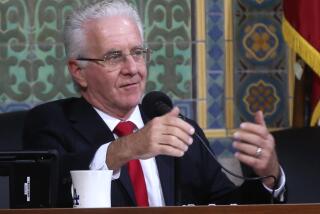Stronger Mortgage Broker Code of Ethics Called For
- Share via
California’s real estate commissioner Tuesday urged passage of a strengthened code of ethics for mortgage loan brokers as a way to protect the public from unscrupulous operators and “enhance the professionalism” of the state’s real estate industry.
In a public hearing at the State Building, Commissioner James A. Edmonds Jr. took testimony from industry representatives on a series of proposed changes in regulations governing the real estate and mortgage loan businesses.
While a code of ethics already exists, the changes would outline more specifically what constitutes illegal and unethical business practices, especially in mortgage loan brokerage, analysts for the state Department of Real Estate said.
“The industry has been under fire,” said Robert McCabe, the department’s northern regulatory manager. “The regulations are action being taken to strengthen how you do business out there in a more professional, legal, ethical manner.”
Edmonds cited a recent article by The Times that recounted numerous criminal and civil cases involving alleged equity-lending fraud as evidence of the need for better regulations.
The new code of ethics spells out several “acts and omissions” that would be considered to be “fraud” or “dishonest dealing” and could be grounds for losing a real estate broker’s license. Among them:
- Misrepresenting to a borrower that there is an existing lender when there is not one.
- Misleading the purchaser of a loan about the borrower’s ability to pay it back.
- Knowingly underestimating closing costs.
- Offering “free” services in a loan transaction when there is in fact a hidden fee.
- Failing to account to a borrower how any advance fees are spent.
- Lying about terms and conditions of a loan that uses real property as collateral.
Reaction from industry representatives, including the 100-member California Independent Mortgage Brokers Assn., was mixed.
They voiced general support for the measures but objected to labeling all bad practices as “fraud or dishonest dealings” because such language might make it easier for borrowers and others to sue brokers.
More to Read
Inside the business of entertainment
The Wide Shot brings you news, analysis and insights on everything from streaming wars to production — and what it all means for the future.
You may occasionally receive promotional content from the Los Angeles Times.











